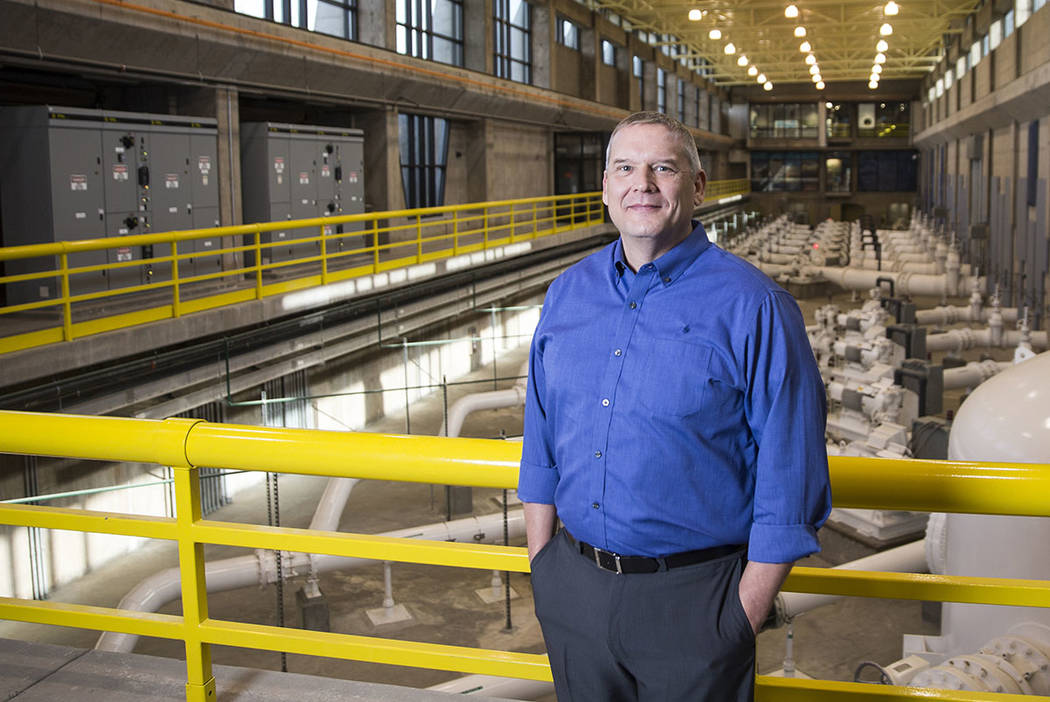Clark County water sales tax may become permanent
A quarter-cent sales tax for water and sewage infrastructure in Clark County currently set to expire in six years may instead become permanent.
The Southern Nevada Water Authority voted Thursday to ask the county commission to remove the tax’s expiration to avoid losing a revenue source that has generated more than $1.4 billion over the past two decades.
“This sales tax is critical, and not only for the water authority but for water and wastewater systems across Clark County,” water authority General Manager John Entsminger told his board of directors shortly before they unanimously approved recommending the county make the tax permanent.
The commission, in a future meeting, will have to sign off on lifting the tax’s sunset provision for it to be official, although three members of the commission also sit on the water authority’s board. The commission needs five votes to remove the sunset.
‘Logical course correction’
Established by Nevada lawmakers in 1997, and overwhelmingly backed by voters a year later, the tax was sold as a way to collect funding in order to expand the water system in a fast-growing region and to improve water quality, according to Entsminger.
But the tax also has an end date: June 30, 2025, or whenever revenues reached $2.3 billion, whichever comes first. The sunset provision only applied to Clark County and, in 2011, state lawmakers authorized the commission to strip the sunset clause by two-thirds vote.
North Las Vegas Councilman Scott Black, a water authority board member, described the Legislature’s 2011 decision as “a logical course correction.”
Since 1999, when the tax went into effect, tens of millions of dollars have been distributed to agencies and communities throughout the county, including more than $898 million to the authority, Entsminger said. The money, supplying about 12 percent of authority revenues, has helped pay the debt service on bonds that funded nearly 200 individual capital projects valued at close to $5 billion, according to Scott Huntley, the authority’s public services senior manager.
About $489 million has been distributed to local governments for sewer services in the valley, Huntley added.
Detractors worry about misuse
The urgency to act now to get rid of the sunset clause is prompted largely by how favorably bond buyers and rating agencies view stable, long-term revenue projections, according to Entsminger.
Cities, union leaders, business groups and homebuilders supported keeping the money from the tax flowing because of its ability to supply significant money to water and sewer projects with help from tourists and without hurting ratepayers.
“If not for this quarter-cent sales tax, the burden of that funding would fall squarely upon the residents and customers,” said Priscilla Howell, the director of utility services for the city of Henderson. She said the city has received $73.6 million to invest in critical water treatment facilities.
But some detractors worried that revenues might be misused, or diverted to a controversial $15 billion plan to construct a 300-mile pipeline that would pump groundwater from eastern Nevada to Las Vegas. To that end, county Commissioner Justin Jones, who sits on the authority board, made sure the authority’s recommendation specified that no proceeds from the tax be used for the proposed pipeline.
Kyle Roerink, the executive director of the environmental group Great Basin Water Network, said he was concerned about the authority’s spending.
“I think it would behoove SNWA to illustrate a full accounting of how they’re spending it,” he said.
Still, he called assurances the money would only be used in Clark County a victory.
As the plan to remove the sunset clause heads to the commission, it will face opposition from at least one policymaker: Tick Segerblom. The commissioner said that water should be for paid by customers to promote conservation.
“It’s kind of self-defeating because everyone agrees the price of water is correlated with how much water you use,” he said. “At some point we need to recognize we live in the desert, and the more water costs, the less people use.”
Contact Shea Johnson at sjohnson@reviewjournal.com or 702-383-0272. Follow @Shea_LVRJ on Twitter.























